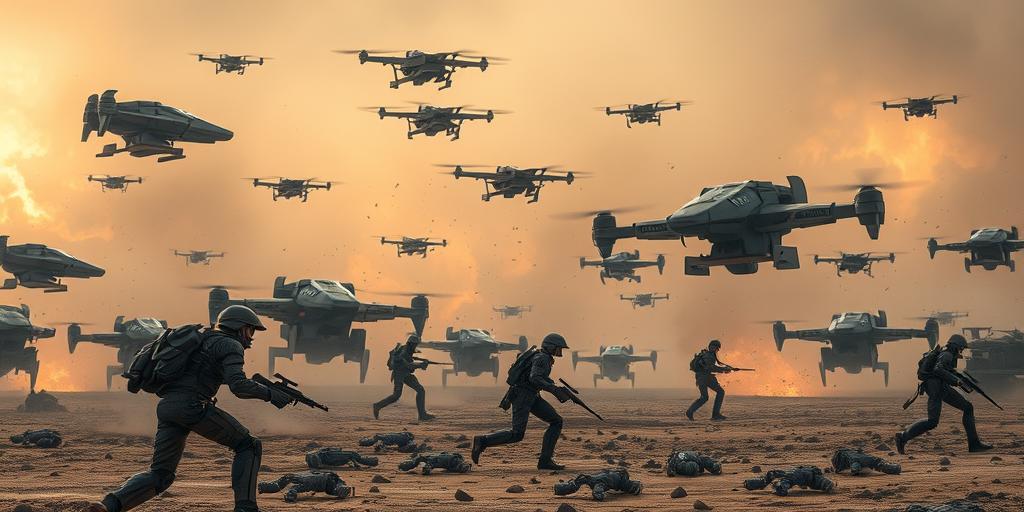The rapid advancement of artificial intelligence (AI) has sparked a debate about its potential impact on warfare. While AI holds promise for improving military capabilities, concerns about its ethical implications and the potential for unintended consequences have raised alarms. This post explores the rise of AI in warfare, the ethical concerns surrounding it, and the ongoing efforts to regulate its development and use.
The Rise of AI in Warfare
AI is rapidly transforming the military landscape, offering new capabilities and redefining the nature of warfare. Its integration into military operations is happening across various domains, including:
Autonomous Weapons Systems (AWS)
Autonomous weapons systems (AWS), also known as killer robots, are weapons that can select and engage targets without human intervention. They raise significant ethical concerns, as their use would blur the lines of accountability and potentially lead to unforeseen consequences. The development and deployment of AWS are subject to intense debate and calls for international regulation.
AI-Powered Intelligence Gathering
AI is revolutionizing intelligence gathering by analyzing vast amounts of data from various sources, including satellite imagery, social media, and sensor networks. This enables quicker and more accurate threat assessments, improved targeting, and better situational awareness.
AI-Enhanced Command and Control
AI-powered systems are being used to optimize command and control operations, enhancing decision-making, resource allocation, and logistics. These systems can process information from multiple sources in real-time, providing commanders with a comprehensive view of the battlefield and enabling faster and more informed decisions.
Ethical Concerns and the Debate
While AI offers significant advantages in military operations, its use raises serious ethical concerns that demand careful consideration. The potential for unintended consequences, loss of human control, and the risk of bias in AI systems are just some of the issues that must be addressed.
Loss of Human Control and Accountability
The development of autonomous weapons systems (AWS) raises concerns about the loss of human control over the use of force. If machines are given the authority to make life-or-death decisions, who is responsible for their actions? This raises complex questions about accountability, transparency, and the potential for mistakes or malfunctions to have devastating consequences.
The Risk of Escalation and Unintended Consequences
The use of AI in warfare, particularly with AWS, carries the risk of escalating conflicts beyond human control. AI systems may be less capable of understanding complex geopolitical situations and the nuances of human interactions, potentially leading to unintended consequences that could trigger wider conflicts.
Bias and Discrimination in AI Systems
AI systems are trained on data, and if that data is biased, the resulting system will also be biased. This poses a significant risk in military applications, as biased AI systems could make discriminatory decisions, leading to wrongful targeting or the escalation of conflicts.
International Regulations and Efforts
Recognizing the potential risks associated with AI in warfare, international organizations and governments are working to establish regulations and guidelines for its development and use. These efforts aim to ensure responsible AI development and mitigate potential risks.
The Campaign to Stop Killer Robots
The Campaign to Stop Killer Robots is a coalition of non-governmental organizations (NGOs) advocating for a preemptive ban on autonomous weapons systems. This campaign aims to prevent the development and deployment of weapons that can select and engage targets without human intervention, arguing that such systems pose an unacceptable risk to international security and human rights.
The United Nations Convention on Certain Conventional Weapons
The United Nations Convention on Certain Conventional Weapons (CCW) is an international treaty that regulates the use of specific conventional weapons. In 2017, the CCW established a Group of Governmental Experts (GGE) to discuss the implications of autonomous weapons systems. While no binding agreement has been reached, the GGE’s discussions have raised awareness about the ethical and legal challenges posed by AWS and are laying the groundwork for future regulations.
The Future of AI Governance
The development of AI governance frameworks is crucial to ensure that AI is used responsibly and ethically, particularly in the context of warfare. This includes establishing international norms, developing ethical guidelines for AI development, and creating mechanisms for accountability and oversight.
The Future of AI in Warfare
The integration of AI into warfare is likely to continue, shaping the future of conflict and raising significant challenges. While AI can enhance military capabilities and potentially improve the safety of soldiers, its responsible development and use are paramount.
The Potential for Good and the Need for Responsible Development
AI has the potential to improve military operations, enhance situational awareness, and minimize casualties. However, this potential can only be realized if AI is developed and deployed responsibly, with ethical considerations at the forefront.
The Importance of International Cooperation and Dialogue
International cooperation and dialogue are crucial to address the ethical challenges posed by AI in warfare. Sharing best practices, developing common standards, and working collaboratively on governance frameworks are essential to ensure that AI is used for good and not for the advancement of conflict.
The Role of AI in Shaping the Future of War and Peace
The future of war and peace is inextricably linked to the development and use of AI. Its potential to exacerbate conflicts or to contribute to peacebuilding and conflict resolution will depend on the choices we make today. By embracing ethical considerations, fostering international cooperation, and promoting responsible development, we can ensure that AI is used to build a more peaceful and secure world.




